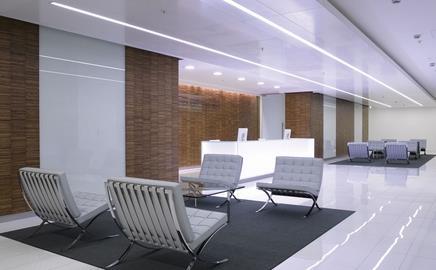Company focus The dotcom disaster taught fit-out firm Modus Group to take nothing for granted
ŌĆ£The traditional consulting world takes a dim view of us,ŌĆØ says Toby Benzecry, co-founder of fit-out contractor Modus Group. ŌĆ£Because we do design-and-build work, architects, QSs and M&E consultants perceive us to be stealing food from their mouths.ŌĆØ
Design and build has been the cornerstone of ModusŌĆÖ rapid growth in the past 15 years. Its yearŌĆÖs accounts to 31 December 2006 show that turnover reached ┬Ż64m, up from ┬Ż44m in 2005 and ┬Ż24m in 2004. Benzecry predicts that this will reach ┬Ż76m in 2007 but insists those nervous consultants have nothing to fear.
ŌĆ£WeŌĆÖre not competing with architects ŌĆō weŌĆÖre competing with design-and-build companies,ŌĆØ he says. He acknowledges that some of the criticism levelled at the design and builders is valid: ŌĆ£You donŌĆÖt know what youŌĆÖre getting in terms of quality of work and price, and clients donŌĆÖt always get good value.ŌĆØ But of course this does not apply to Modus.
In fact, he says, consultants working for the company will find it user-friendly. Benzecry is an and a management consultant by background; his co-founder Ashley Wilson is a QS.
And in any case, things may be about to change. Modus plans to change the balance of its work over the next year to limit its dependency on risky design and build. Benzecry and his directors hope to grow the projects division, which works in the traditionally procured office fit-out sphere.
ModusŌĆÖ caution is born of experience. In the late 1990s, the firm was on accountant DeloitteŌĆÖs list of the fastest-growing companies for five years running, but in 2001 it suffered a blow when the dotcom bubble popped: much of its success was based on data centres and office fit-outs in the technology sector.
Getting a contractor back to a fit-out site is notoriously difficult
Toby Benzecry
ŌĆ£Everyone else caught a cold ŌĆō we caught flu,ŌĆØ says Benzecry wryly. ŌĆ£After the downturn we decided to rebuild in a different way. We didnŌĆÖt want to be dependent on the private sector or on design and fit-out jobs where thereŌĆÖs greater risk.ŌĆØ
Modus realised that it could use its M&E expertise jobs to enter the universities sector, refitting laboratories. Imperial College London is now its biggest client, giving it ┬Ż10m of work a year.
The three fit-out divisions within Modus Interiors contribute ┬Ż56m to the groupŌĆÖs turnover. The rest comes from its newer facilities management division, Modus FM. In 2007, Benzecry hopes to see 10% growth in the Interiors business and 20% in facilities management, which he says is largely secured already.
Fit-out clients are offered support from the FM division for 12 months after completion. ŌĆ£Getting a contractor back to a fit-out site is notoriously difficult,ŌĆØ says Benzecry. ŌĆ£We want to convince clients that they should buy some level of service from FM, whether itŌĆÖs changing lightbulbs or maintaining air-conditioning. Next time they want their offices done, they look no further as weŌĆÖre already working for them.ŌĆØ
Modus is keen to secure more framework deals, and Benzecry is considering creating a division specifically for these. He has just landed two that will be announced later in the year.
ModusŌĆÖ pre-tax margins are 3% but Benzecry says it will be ŌĆ£pickyŌĆØ about taking on lower margin work in future to stave off the fate of collapsed fit-out specialists such as Curzon. Despite improving profits, after its dotcom disaster Modus takes nothing for granted.
Postscript
Search for previous articles on Modus at


























No comments yet